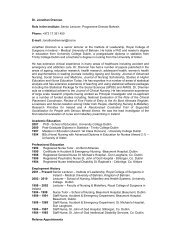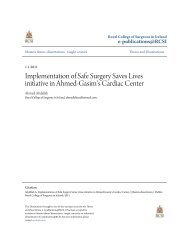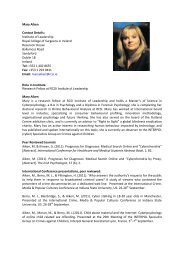Improving the Assessment and Triage of Patients with Mental Illness ...
Improving the Assessment and Triage of Patients with Mental Illness ...
Improving the Assessment and Triage of Patients with Mental Illness ...
You also want an ePaper? Increase the reach of your titles
YUMPU automatically turns print PDFs into web optimized ePapers that Google loves.
However <strong>the</strong>re are a large number <strong>of</strong> patients who may require more intensive intervention<br />
<strong>and</strong> possible admission. These individuals will <strong>the</strong>n present to <strong>the</strong> emergency department,<br />
<strong>of</strong>ten deciding not to attend <strong>the</strong> G.P, in order to access <strong>the</strong> mental health services <strong>with</strong>in <strong>the</strong><br />
hospital.<br />
The triage nurse is generally <strong>the</strong> first point <strong>of</strong> contact for patients <strong>with</strong> mental illness.<br />
The Manchester <strong>Triage</strong> System is used to assess patients <strong>with</strong> <strong>the</strong> allocation <strong>of</strong> a triage<br />
category based on level <strong>of</strong> acuity. At present <strong>the</strong>re is no streaming <strong>of</strong> patients in <strong>the</strong><br />
department which means that those <strong>with</strong> a mental illness will be triaged in <strong>the</strong> same way as<br />
individuals presenting <strong>with</strong> medical or surgical complaints. All triaged patients are <strong>the</strong>n<br />
returned to <strong>the</strong> waiting room unless <strong>the</strong>y need immediate intervention. They <strong>the</strong>n wait until<br />
<strong>the</strong>y are called through to <strong>the</strong> cubicle area to be assessed by a clinician. <strong>Patients</strong> <strong>with</strong> mental<br />
illness in <strong>the</strong> vast majority <strong>of</strong> cases will be reviewed by an emergency department clinician<br />
first <strong>and</strong> <strong>the</strong>n if deemed necessary referred to a psychiatrist. Few patients are seen directly by<br />
<strong>the</strong> psychiatrist if <strong>the</strong>y attend <strong>the</strong> ED. This may cause <strong>the</strong> patient fur<strong>the</strong>r psychological<br />
distress due to long waiting times in an overcrowded <strong>and</strong> noisy waiting room<br />
Ano<strong>the</strong>r issue in <strong>the</strong> emergency department in relation to caring for patients <strong>with</strong><br />
mental illness is <strong>the</strong> lack <strong>of</strong> formal training <strong>and</strong> education <strong>the</strong> emergency nurse receives in<br />
this specialist area. While <strong>the</strong> triage nurse plays a pivotal role in <strong>the</strong> assessment <strong>of</strong> all<br />
patients, a possible lack <strong>of</strong> knowledge <strong>and</strong> underst<strong>and</strong>ing in relation to those presenting <strong>with</strong><br />
mental health issues, may place <strong>the</strong> patient at a disadvantage. Traditionally triage was<br />
concerned <strong>with</strong> physical illness or injury <strong>and</strong> accordingly, psychological factors were<br />
secondary considerations.<br />
In an effort to address <strong>the</strong>se issues, I firstly developed a triage system in <strong>the</strong> form <strong>of</strong> a<br />
computerised pop-up screen that can be accessed by <strong>the</strong> nurse if it appears that <strong>the</strong> patient is<br />
presenting <strong>with</strong> mental health issues. The triage nurse is <strong>the</strong>n prompted to answer seven<br />
questions in relation to <strong>the</strong> patient. Six out <strong>of</strong> <strong>the</strong> seven questions require a “yes” or “no”<br />
answer, while <strong>the</strong> remaining question is to ascertain who is accompanying <strong>the</strong> patient. The<br />
reasoning behind this initiative was two-fold: firstly to ensure that <strong>the</strong> triage nurse would ask<br />
<strong>the</strong> more relevant questions <strong>and</strong> secondly, it was envisaged that it would potentially reduce<br />
triage time, as <strong>the</strong> nurse would spend less time on <strong>the</strong> h<strong>and</strong> written report. The second<br />
element to my project was <strong>the</strong> implementation <strong>of</strong> a “triage tool” which was adapted from <strong>the</strong><br />
3
















